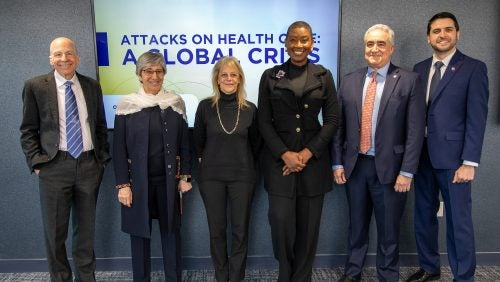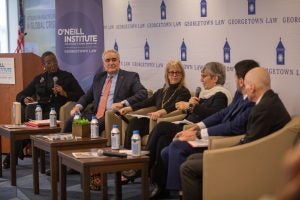Georgetown Law Professors Defend Health, Humanitarian Law at ‘Attacks on Health Care: A Global Crisis’
April 3, 2024

L-R: Prof. Lawrence Gostin, Sima Samar, Karen Joy Greenberg, Prof. Michele Goodwin, Saman Zia-Zarifi and Houssam al-Nahhas
Dr. Houssam al-Nahhas hoped to become a cardiac surgeon. Instead, he was tortured and detained for providing medical care during the Syrian uprising — and was forced to sign a pledge promising not to treat patients with alleged anti-government ties upon his release. "I just could not imagine how providing health care can be a crime, until I experienced it firsthand," he said of the experience, which motivated him to devote his career to documenting similar attacks on health care providers.
Al-Nahhas shared his story at “Attacks on Health Care: A Global Crisis,” a Feb. 27 event organized by Georgetown Law’s O’Neill Institute for National and Global Health Law that gathered leading clinicians and legal and regional experts to discuss attacks on health care — including the kind of unlawful detention that al-Nahhas experienced — and the role of international humanitarian law in protecting clinicians and civilians alike.
The discussion was moderated by Professor Michele Goodwin, co-faculty director of the O’Neill Institute, who was joined by fellow O’Neill Institute faculty director Professor Lawrence Gostin. The pair’s first joint article on humanitarian law and health care, “Wars in Gaza and Beyond: Why Protecting the Sacredness of Health Matters,” which offers recommendations for the legal safeguarding of health and human rights during wartime, was published in The Journal of the American Medical Association last year.
Other panelists included al-Nahhas, the Middle East and North Africa researcher at Physicians for Human Rights (PHR); PHR Executive Director Saman Zia-Zarifi; physician and Nobel Peace Prize nominee Sima Samar, chairperson of the Commission for the Prevention of Torture and Karen Joy Greenberg, director of the Center on National Security at Fordham Law.

Participants discussed international humanitarian law in light of global conflicts.
During a wide-ranging discussion, the panelists traced the emergence of international humanitarian law after World War II and discussed the recent erosion of humanitarian norms in light of ongoing global conflicts in Gaza, Ukraine, Myanmar and elsewhere. The panelists also discussed the promises and limitations of enforcement mechanisms such as economic sanctions and the International Criminal Court, which was established in 2002 to investigate and prosecute individuals accused of war crimes.
Despite the urgent need for action — in 2022, there were more than 1,900 documented attacks and threats against health care facilities and personnel, according to findings from PHR — the panelists noted that obstacles to enforcement remain.
“Even as clear as … the cause of preserving health care and health institutions may be … there are still people who respond negatively to that [need],” said Goodwin, who pointed to the immediate and intergenerational consequences of the “chilling effect” that occurs when civilians avoid seeking routine or needed medical treatment out of fear that hospitals and other facilities will be attacked or otherwise targeted.
“When you break a health system, you’re breaking more than the doctors and the hospitals and the infrastructure,” Gostin said. “You’re breaking the determinants of what makes a population healthy and safe. In the long term, that can be a greater risk.”
Watch the full conversation: